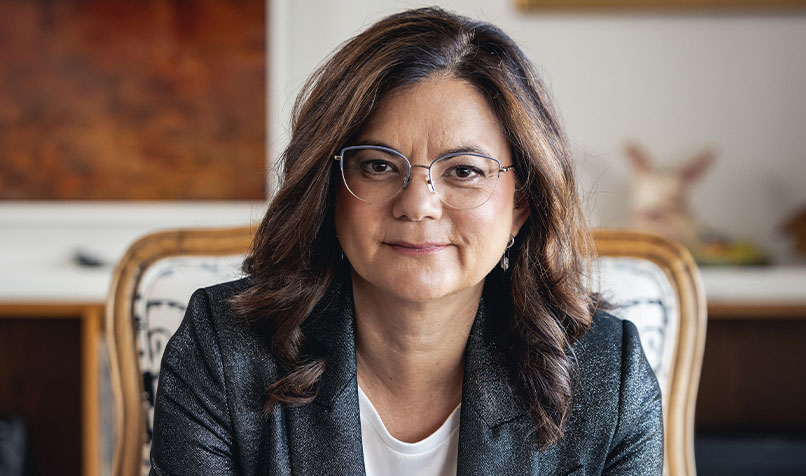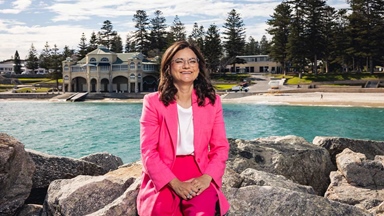Loading component...
At a glance
A career in finance and accounting has taken Katina Law FCPA on a unique journey, both geographically – to Peru, Brazil, Hong Kong, the US, the UK, Tanzania and Indonesia – and as an Indigenous woman in a male-dominated industry.
After a bright start with the Argyle Diamonds Graduate Program in Western Australia in the 1990s, Law took a job as a finance consultant with PT Mincom Indoservices. On her first day, she travelled by helicopter over thick jungle into a mine site in Kalimantan on the island of Borneo, where she remained for six weeks at a time.
Towards the end of her four years in Indonesia, the country entered a period of political instability. By then, Law was working for Newmont Mining. The company was building a copper mine on the island of Sumbawa. When sectarian violence broke out in the region, the accounting team played a vital role in helping staff get to safety.
“The accounting department was given crates of cash,” Laws recalls. “We set ourselves up in a hotel room, and queues of local staff appeared.
“We asked each person how many family members they had with them and where the rest of their family was based in Indonesia. We calculated what they needed for airfares and gave it to them.”
Law has a deep understanding of the mining industry. She has taken many trips underground, including a 1000-metre plunge into a gold and nickel Silver Swan Project north-east of Kalgoorlie in Western Australia.
The mining sector's high-tech future
A misunderstood industry
After several years of being immersed in the mining industry, Law moved to the UK to further her education with an MBA from the London Business School.
This opened a pathway into more corporate roles, and Law took up the position of senior manager of business analysis at Newmont Mining Corporation in Colorado in the US.
After completing her education, Law could have gone anywhere and done anything – but she stuck with mining. The decision was easy, she says.
“I have always loved mining. I love the scale of it, the big machinery and often being in a remote location. With mining, you can work anywhere in the world – from the most remote places to the biggest cities,” she says.
Law welcomes the strides that the mining industry has made in the past decade to achieve diversity at the highest levels of leadership – especially on boards.
However, she believes the industry has more work to do to communicate the benefits it provides to communities where mining sites are in operation.
“I think mining undersells itself as an industry,” says Law. “It gets a bad rap, but it does a huge amount of good in the places where it goes. There’s nothing like a mine to create wealth in some of the most remote places on the planet.”
Mining has a long-term future alongside carbon-neutral economies, she says.
“The move towards decarbonisation requires minerals. For example, the batteries for electric cars need nickel, lithium and copper. You cannot harness the sun and wind without something that’s either grown or mined.”
Impact at home

Law is of Indigenous and Greek background, and she says she has long wanted to improve First Nations people’s pathways into professional services.
Law co-founded IPS Management Consultants for this reason. IPS has become one of Australia’s largest independent majority First Nations‑owned management consultancies, Law says.
The company works with the federal government, state governments and large corporates on five different service lines, some of which focus on boosting Indigenous employment opportunities.
“There’s very few Indigenous people in consulting, yet Aboriginal people are the most consulted people in Australia,” says Law. “Everyone wants to ask them about what’s going on. My idea was to create an environment where we could help Indigenous people become professional consultants.”
“The biggest challenge is that there are hardly any Indigenous accountants, so younger people are not really seeing role models in the community,” Law says.
The adage of “You can’t be what you can’t see can become self-fulfilling.
“For Indigenous accountants themselves, it’s about creating connections and building a career when you don’t necessarily have anyone around you who has trodden the same path,” she says.
How accountants can ‘show up’ for Indigenous communities
Transformative employment
One aspect of IPS work is to operate large–scale employment programs that guide unemployed people towards full-time work on infrastructure projects.
“There are some amazing stories about people’s lives being transformed by these programs. It is something that I’m proud of,” Law says.
IPS also offers a First Nations cultural advisory service on issues such as unconscious bias and working with Indigenous people.
In addition to projects that have an Indigenous focus, IPS runs more mainstream projects, such as the women’s leadership program with Tennis Australia.
“There are lots of women in tennis clubs, but mostly they’re not on the ‘executive’ side, or they might be the secretary, but they’re not the president,” says Law. “It is about getting more women into those more senior leadership roles in tennis clubs around Australia.”
IPS also provides senior leadership training for the Australian Taxation Office and business advice for small businesses, which is a partnership with the Western Australia Small Business Development Commission.
Law is also a co-founder and director of Dutjahn Sandalwood Oils, which makes sandalwood oil that is sold into international perfume markets. The oil is sourced from First Nations harvesters and the state government, which generates employment opportunities.
Self-determination
Throughout her career, Law has mentored many of First Nations people, and she derives great personal satisfaction from seeing them develop their businesses.
“I’m a strong believer in entrepreneurship as a part of self-determination,” she says. “Being an entrepreneur is hard, but it gives you more control over your life on a day-to-day basis. It suits many people for that reason.”
In 2017, Law made history when she became the first Indigenous woman to chair an ASX-listed company, Ardea Resources. She was the chair for the next three years, during which time she became the chair of another ASX‑listed company, Yandal Resources.
“To me, being the chair isn’t about being the leader and telling everyone what’s going to happen,” she says. “It’s more about bringing people together and coming to a consensus, and then helping everyone to go in that direction.”
One piece of advice
On securing a board role with an ASX-listed company: “You have to put yourself out there. You need to show up and talk to people. You have to build relationships with men, basically, because ultimately, it’s men who control most of these opportunities. It is harder to do as a woman, but it can be done.”

